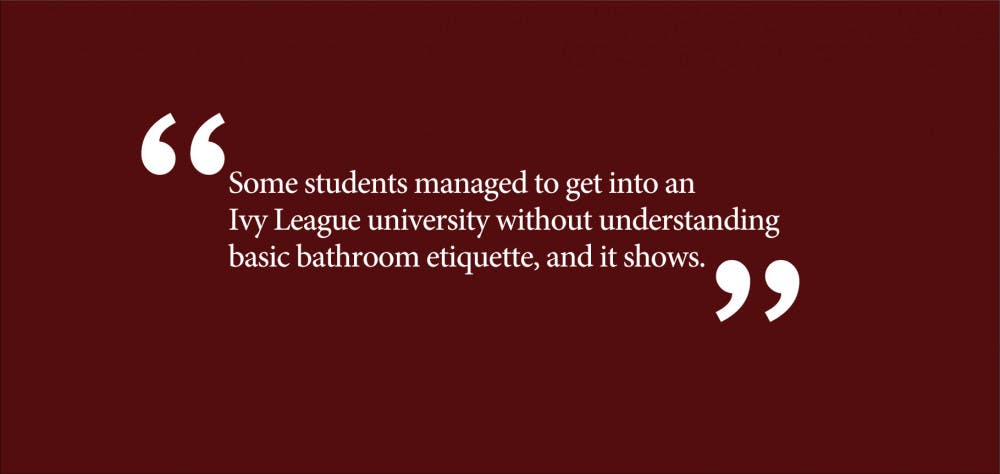On March 8, International Women’s Day, I walked into one of two single-stall, gender-inclusive restrooms on my floor, and discovered dried urine on the toilet seat. I sighed. Earlier that week, tired of similar situations happening despite an email from our hall’s community advisor, I had taped signs above the toilets in each of the bathrooms that read “PLEASE STOP PEEING ON THE TOILET SEAT.” My efforts had, clearly, gone unappreciated.
One survey of British adults found that they spend around three hours each week on the toilet. I could find no similar study on college students, but I feel comfortable assuming that most dorm-bound students spend at least 20 minutes each day, including showering, brushing teeth and doing their business, in the restroom. With so much time being spent in a single location, you’d think that students would be actively invested in keeping it sanitary.
You’d be wrong. Some students managed to get into an Ivy League university without understanding basic bathroom etiquette, and it shows. Thus, I suggest that every first-year unit should receive a mandatory training session on how to respect a shared space. Such a lesson has the potential to massively improve the quality of life within Brown’s residential halls, which in turn could lead to improved mental health, fewer instances of students going off-campus and inflating housing prices and an overall increase in the senses of community and camaraderie that exist in an ideal dormitory-style living situation.
Let me be clear that this is not an attack on gender-inclusive bathrooms — this problem pervades in single-sex restrooms as well. While I would appreciate a personal apology from every cisgender man whose inconsiderate streams have forced me to squat while urinating, all genders are equally capable of disrespecting bathrooms. Bathroom Orientation should include a considerable segment on “How Not to Pee on a Toilet Seat,” but it should go beyond that. I have frequently come across bathrooms with soaked walls and flooded floors that would only happen if someone took a shower and just didn’t shut the curtain. Flushing the toilet is also not a given, nor is the arduous task of wiping up your hair after you’ve shaved. Gender neutral bathrooms offer many benefits that make our communities more affirming for transgender and gender non-conforming students. Bathroom Orientation would equip all students with the tools to maintain a clean and healthy environment in all types of restrooms, benefiting everyone involved.
It’s stressful to walk into a bathroom and not know what you’re going to find. Sure, in a gas station bathroom, you can steel yourself for subpar conditions, but you shouldn’t have to do that in the building that’s supposed to be your home. If students are taught how to treat their restrooms with respect, then that will lessen the anxiety of germophobic students and those who just want to use the toilet without wallowing in other people’s waste.
It has been well-documented that Rhode Island does not have enough housing to meet growing demands. In 2018, Ward 1 Councilman Seth Yurdin briefly introduced a measure that would limit the number of undergraduate students allowed to live in a single housing unit. Although Yurdin ultimately withdrew the proposal, his reasons for suggesting it are telling. According to the Providence Journal, Yurdin’s “original intent in introducing the amendment was to address rising housing costs caused by housing units being effectively turned into dormitories.”
Maybe students wouldn’t be so desperate to leave campus and live only with people they know if they could be assured that their dormmates would show a basic level of respect to their shared spaces. Bathroom Orientation couldn’t guarantee cleaner bathrooms, but let’s assume best intentions for a minute and think that some people are leaving their urine to dry on toilet seats or not closing their shower curtains out of ignorance. A quick meeting explaining why these are inconsiderate acts could have a long-term impact on on-campus retention.
Finally, I’m just going to be blunt: it’s hard to be friendly with the people on your floor when you know that at least some of them can be absolute slobs. Am I supposed to cheerfully greet the kid in boxers at the sink, when in the back of my head I’m wondering if they’re the one who soiled an innocent toilet seat? Can I really be expected to strike up a conversation with someone when their beard looks suspiciously like the hair that was left all over the sink last week? I respect everyone on my floor, but it’s difficult to feel a sense of community when communal spaces are so constantly disrespected.
Does Brown have bigger fish to fry than holding the hands of students who don’t understand or don’t care about basic bathroom courtesy? Sure. Would it be nice to see this happen anyway? Absolutely. But I’m not holding my breath. In the meantime, to my peers, I beg you: close your shower curtains, clean your hair and above all, please watch your aim.
Caroline Mulligan ’19 can be reached at caroline_mulligan@brown.edu. Please send responses to this opinion to letters@browndailyherald.com and other op-eds to opinions@browndailyherald.com.





